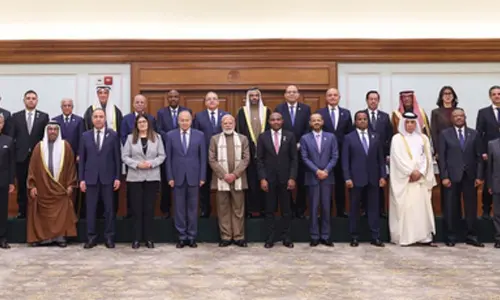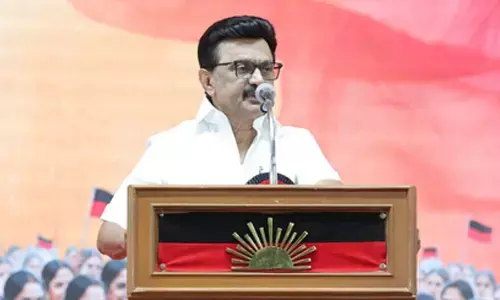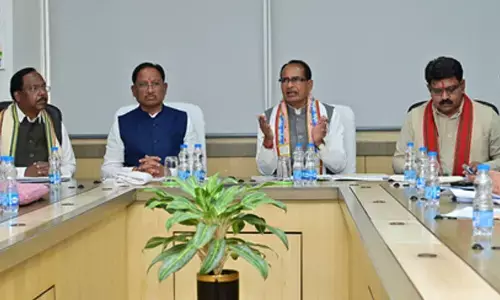MSMEs Day 2024: Girish Rowjee, CEO of greytHR on Empowering MSMEs

Girish Rowjee discusses challenges and solutions for MSMEs, highlighting support systems and initiatives for sustainable growth.
MSME Day is celebrated annually on June 27 to recognize the vital role Micro, Small, and Medium Enterprises (MSMEs) play in driving economic growth, innovation, and job creation globally. This day highlights MSMEs' contributions to sustainable development and promotes awareness of the challenges they face. This year's theme is "Building a Stronger Future Together."
In an exclusive interview with The Hans India, Girish Rowjee, Co-founder and CEO of greytHR, shared his insights on the crucial role of Micro, Small, and Medium Enterprises (MSMEs) in India's economy. Contributing over 29% to India's GDP and 50% to total exports, MSMEs are vital for economic growth. As the world celebrates MSME Day on June 27, Rowjee emphasizes the need for a collaborative effort to empower and enhance the performance of these enterprises.
Girish Rowjee, Co-founder and CEO, greytHR
Mr Girish shares that as the world celebrates MSME Day on June 27, 2024, we need to work together to empower more MSMEs to do better. The 'we' here refers to the ecosystem that supports the growth of MSMEs in our country. This ecosystem comprises the MSMEs themselves, the government, educational institutions, community builders, and technology providers, among other enablers.
In this journey to build a stronger future together, a few primary challenges have to be addressed. The best part: several MSME-focused initiatives are already active in our country. These are a few (the names are self-explanatory): Startup India: provides several benefits to foster entrepreneurship in the country, Credit Guarantee Scheme for Micro & Small Enterprises (CGTMSE), Micro & Small Enterprises Cluster Development Programme (MSE-CDP) Scheme, A Scheme for Promotion of Innovation, Rural Industries and Entrepreneurship (ASPIRE), Entrepreneurship Skill Development Programme (ESDP) Scheme.
Addressing MSME Challenges
MSMEs operate in different areas of business that have their pros and cons. Opportunities and pitfalls. However, every business can tide over its crisis and move towards success by adopting the right approach. No business can achieve the same without a robust plan to enhance productivity, innovation, and growth. However, none of these can be easily achieved without the right strategy to address the most common challenges.
Funding Limitations
MSMEs seek funding not only to survive but also to thrive. However, many of them find it hard to secure timely access to finance at affordable interest rates. The lack of credit history and right collateral are the usual reasons. Financial literacy and access to lending schemes by the public and private sector organizations are two common solutions. In India, the schemes of National Small Industries Corporation (NSIC) aim to make affordable credit accessible to eligible MSMEs.
Infrastructure Barriers
Emerging businesses may not have the luxury of operating from swanky offices with new-age facilities for their employees. In many cases, even the bare necessities are unavailable. It's a no-brainer that the cost of real estate is higher in urban areas, so these businesses have to operate with minimal facilities. Many who operate from rural areas could face issues related to connectivity, skill sets, and logistics. The government's Micro & Small Enterprises Cluster Development Programme (MSE-CDP) Scheme aims to create infrastructural facilities and Common Facility Centers with plug & play options. Even private organizations provide affordable coworking facilities for businesses of all sizes.
Talent Shortage
Growing organizations may not be able to pay a competitive salary to their employees. Furthermore, these employees could move to larger companies when they don't see growth opportunities. Therefore, these businesses have to make do with the available talent.
Businesses in the MSME space should focus on upskilling their staff so they can improve productivity, innovate, and compete better with their peers. They can overcome this barrier by striking alliances with educational institutions for internships. The Indian government has launched the National Apprenticeship Promotion Scheme (NAPS), a program that encourages establishments to enroll apprentices by providing partial stipend support. The scheme aims to provide on-the-job training and upskilling opportunities.
Limited Market Reach
Many of the MSMEs are good at manufacturing products but they lack the ability to penetrate domestic and international markets. Smaller businesses in the rural areas are dependent on middlemen and larger businesses to sell their products for wafer thin margins. To acquire the know-how, resources, and technology for marketing, they can watch MSME-related TV programs, join local groups, and attend online events. The MSME ministry, in association with the National Small Industries Corporation (NSIC), provides the Marketing Assistance Scheme as a tool to help MSMEs grow their businesses. The e-Procurement and Marketing Support Scheme has been introduced to enhance the marketability of products and services in the MSME sector. The Procurement and Marketing Support (PMS) scheme is another such helpful initiative.
Technology Adoption Issues
Many smaller businesses count on manual processes to produce and sell goods. They usually don't have the know-how or resources to deploy the right technologies. This approach results in lower productivity and slow delivery. If they learn to automate their processes related to compliance, documentation, and computation, they can scale their businesses fast. The Indian government has a Digital MSME scheme to help them adopt ICT tools and applications in production and business so they can streamline their operations and compete globally.
greytHR's Support for MSMEs
A comprehensive, full-suite HRMS platform, greytHR enables small and medium businesses (MSMEs) to automate processes in core HR, payroll, leave & attendance, performance management, compliance, and more. Besides several AI-driven features, the platform provides an employee self-service portal (ESS) with a mobile app for remote access.
When people grow, the business grows. greytHR enables MSMEs to simplify, speed up, and optimize HR processes. Automating HR tasks and providing employee self-service is expected to result in higher productivity, cost savings, employee satisfaction, and faster business growth.
greytHR Academy offers industry-relevant courses in HR Operations, Payroll, Statutory Compliance, New Labor Codes, TDS for Indian Payroll, and more. It also offers programs for entry-level staff and fresh graduates. Aiming to certify over one lakh learners, the academy has launched free and paid courses on Udemy.Trusted by 23,000 customers across 25+ countries, greytHR provides an entire HR ecosystem and not just software.
Conclusion
The contribution of MSMEs to the Indian economy is noteworthy. MSME Day is one of the many ways to recognize them. At greytHR, we have always been committed to their growth and success. Our cloud-based HRMS platform is built to address their needs in an affordable manner. Having worked with thousands of MSMEs, Team greytHR will always remain committed to empowering even more businesses in this space.














